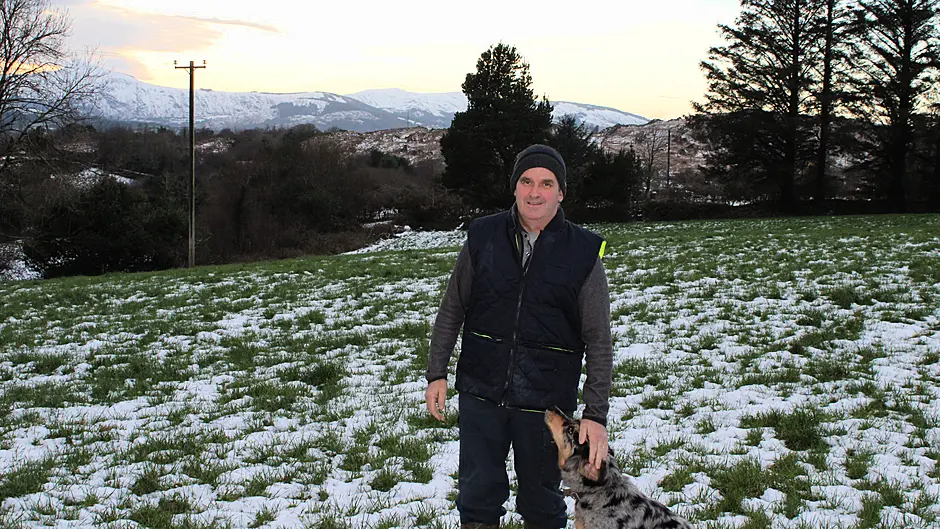Teagasc advisor Ian Lynch looks at the O’Donovan farm outside Dunmanway .
Donal O’Donovan and his wife Catriona run their dairy enterprise in the townland of Keelraheen outside Dunmanway.
Donal took over the farm from his father in 1983 just as milk quotas were coming in.
The farm previously had pedigree Herefords and a handful of dairy cows, however, Donal realised the best future for his farm was to increase the dairy enterprise.
Back when he started, there was 80,000 dairy farms across Ireland compared to today’s 17,000, with milk volumes increasing year on year due to greater efficiencies even though the number of farms has been reducing.
Donal’s farm is of a heavier nature with land going from 50 feet above sea level to over 500 feet.
To suit this land type, in 2010, a smaller type cow which would be better suited to this sort of land was selected and they haven’t looked back since, with no lameness issues presenting on the farm.
Currently, the farm is spread across around 35 hectares which includes five hectares of forestry.
Donal is milking under 50 cows and makes up a part of the 19% of Dairygold farms with less than 50 cows.
In Donal’s 42 years of farming in Keelraheen, he has been constantly adapting the farm to work with the more challenging nature of the land.
Drainage works have been very important and has allowed him to maximise his days at grass and reduce his overall concentrate inputs.
With an EBI of €237, 4.19% Fat and 3.61% Protein, Donal has been putting a strong emphasis on both protein and health when it comes to breeding his replacements in recent years, and will continue this trend going forward.
In 2024, the calves had a health sub index figure of €8 which should increase the longevity of future cows in the herd while reducing health issues that lead to increased labour and costs.
Donal uses 100% AI on the farm and sexed semen is also used.
Sexed semen results have been very good for 2024 and Donal will be following the same breeding plan for 2025.
All cows not in calf to a dairy straw are then given a high DBI straw to try get a more saleable beef calf.
Much like many farmers across West Cork, Donal and Catriona are gearing up for a busy calving season.
His six-week calving rate is above the Teagasc targets at 91%, meaning approximately 40 of his calves will be on the ground in that six-week window.
Donal has been investing in the farm with new calving facilities including three new calving pens.
This will help increase both safety and efficiency on the farm. Efficiency is something that is very important to Donal in order to reduce labour, leading to a more socially sustainable farm.
Donal contracts out much of the machinery work, noting that both the time involved and the investment required for much of the modern equipment cannot be justified at his scale.
‘They have the modern equipment, GPS spreaders, low emission slurry tanks zero grazers and silage equipment,’ said Donal of his local contractors. ‘Their efficiency is great so we are lucky to have good contractors around us.’
One thing that can be said about Donal is that he has put a great emphasis on herd health.
Not only has the correct cow type and size been selected to suit the land type, but Donal has also vaccinated for Rotavirus, Leptospirosis and Salmonella for a number of years and thankfully this has had good results.
All dosing on the farm is done based on dung samples to ensure only the required doses are used.
Selective dry cow therapy (SDCT) is also being used to good effect and is reducing antibiotic use on the farm.
Milk recording has been an essential part of SDCT as it allows Donal to choose the most suitable cows for selective treatment.
Six milk recordings are done per year, meaning a large bank of cow data is available for selecting the most appropriate cows.
A target of 50,000 Somatic cell count (SCC) has been used in previous years and Donal is happy with the results with around 30% of the herd being treated this way.
There is also a herd health programme run on the O’Donovan’s farm, Bulk milk samples are tested throughout the year and any health pressures can be identified by Donal so he can take preventative action to resolve these.
This is helping lower antibiotic use on the farm but also giving peace of mind knowing that his cows are performing
well.
The future for smaller farms like Donal’s is still bright but there are challenges involved.
Economies of scale are an issue with a smaller enterprise and with an uncertainty around the retention of the Nitrates Derogation, farms like Donal’s are finding it hard to plan for the future.
A former chairman of West Cork IFA, one thing for sure is that Donal’s attitude towards farming is incredibly positive.
After 42 years on the farm with his wife and three daughters, two of who have built their homes on the family farm, Donal still loves what he does and is still adapting and changing to the newest information in order to not only run a financially and socially sustainable enterprise, but to also ensure the environment and especially water quality is protected.
• Ian Lynch is a B&T Dairy advisor in the Teagasc Advisory Office in Clonakilty









